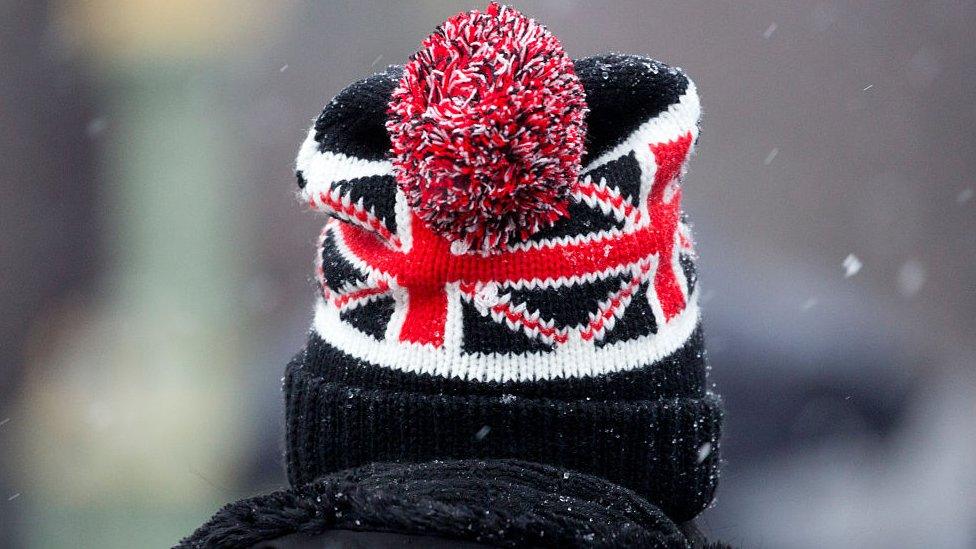Warning over border delays when new checks kick in
- Published
- comments
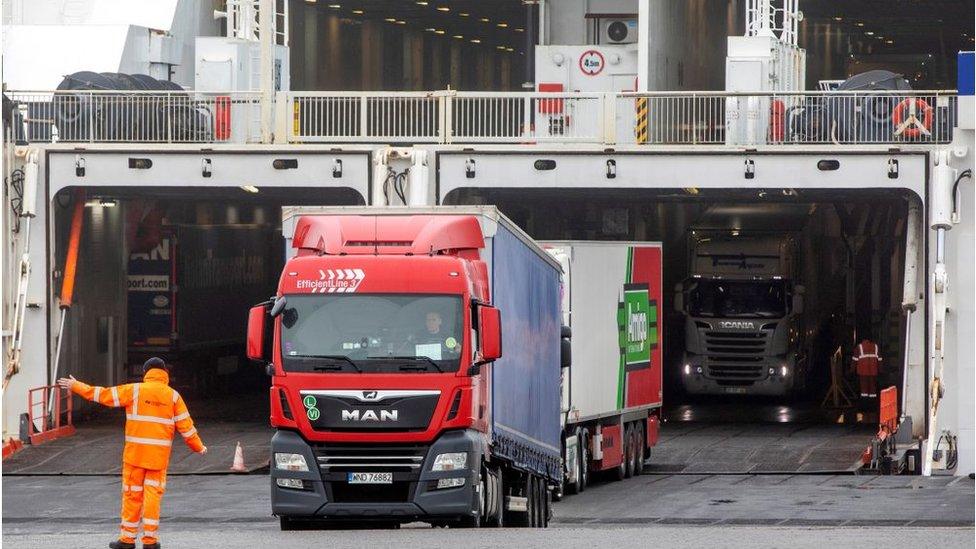
There could be delays at the UK's borders later this year without prompt government action to prepare for new border checks, MPs have warned.
A report from the Public Accounts Committee said there was potential for disruption as passenger volumes returned to normal.
Logistics UK backed the committee's findings saying traffic could "grind to a halt" if more wasn't done soon.
The government said there had been minimal border disruption so far.
It continued to ensure businesses received the support they needed to trade effectively with Europe and seize new opportunities, a government spokesperson said.
But Meg Hillier, chair of the Public Accounts Select Committee said there was "much more work that government should be doing" to ensure the border was operating effectively and to minimise the current burden on firms trading with the EU.
Logistics UK said it was calling on the government to "take action now" to ensure new post-Brexit border controls, including checks on agricultural and food products entering the UK, and biometric checks on passengers entering the EU, could be implemented smoothly in the second half of the year.
"We have just enough time," said Sarah Laouadi head of European policy at the trade body. But she said firms urgently needed more information about which ports would process which products after 1 July.
"Of course you need advance notice to act on this information," said Ms Laouadi.
Without it "the system could potentially grind to halt" she said, with up to 29-mile-long queues at UK ports this summer.
In January new post-Brexit checks on goods contributed to tail-backs in Kent, due to teething troubles around the new paperwork required, Ms Laouadi said.
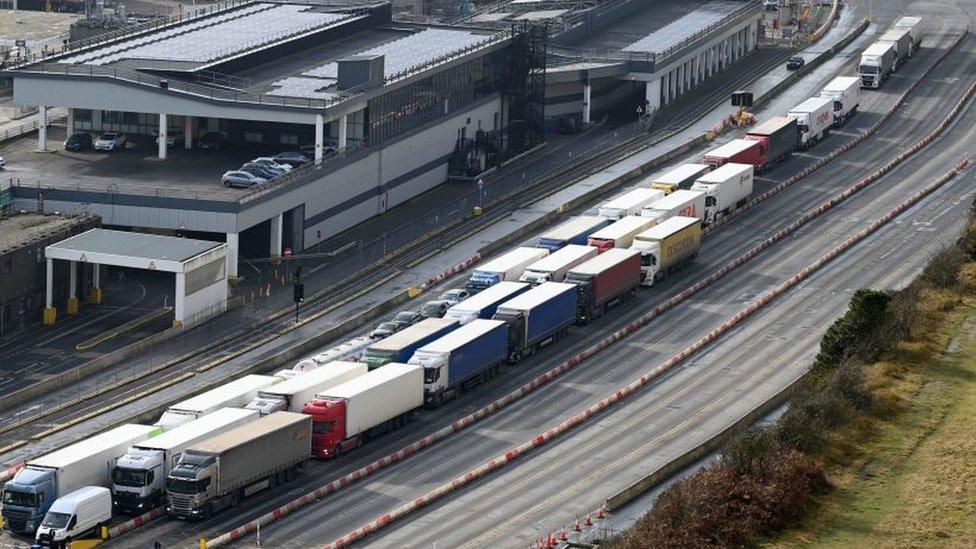
Container lorries queuing at the Port of Dover
The MPs' report said increased costs, delays and paperwork were making it harder for UK businesses to trade as before, and while it was difficult to disentangle the impact of Covid and global economic problems, the cross party committee found Brexit had reduced the UK's trade with the EU.
John Grayson said things were already "verging on the impossible, logistically and financially" for his business, Earth Natural Foods in London.
He has given up importing directly from EU suppliers and has dropped some specific products altogether, like one particular brand of olive oil.
He relies on importers instead, but an order takes three weeks to arrive instead of one.
"A one tonne pallet of goods that used to cost £200, is now near to £600," he added.
Mary Quicke, an artisan cheesemaker based in Devon said she now worries that her EU customers will run out of patience and stop taking her products if these kinds of problems persist.
"There are just all of these barriers to doing what used to be really, really simple which was agreeing to make a sale and then calling the haulier and off it went and you got paid," she told BBC 5 Live.
"Of course they want our cheese, but how long do you carry on doing something you want when it's really tedious and costly and you get charged much more money?"
From 1 July extra checks on agricultural and food imports from the EU will take place at ports around the UK, but with products varying from cut flowers to ready-made lasagne, firms need to know which ports will be authorised to process which products, what the operating hours will be and how they fit with ferry schedules, Logistics UK said.
The Public Accounts Committee noted that some of the required infrastructure will not be completed in time and there were still concerns around staffing, including vets.
In addition, later this year travellers including HGV drivers entering the EU will need to go through biometric passport checks, involve facial recognition and fingerprint scans, as part of the EU's Entry and Exit System.
Ports such as Dover, where EU-entry checks take place on the UK side, therefore need to be adapted to avoid drivers having to get out of their vehicles and walk across lanes of traffic, Ms Laouadi said.
The Public Accounts Committee said it was particularly concerned about what would happen when passenger traffic across the UK border returns to normal levels as the pandemic subsides.
The PAC report urges the government to write to the committee, within six months, setting out the timetable for its planned programme of work on the "noteworthy ambition" to create the world's most effective border by 2025.
A government spokeswoman said: "Traders have adapted well to the introduction of full customs controls on 1 January, with minimal disruption at the border and inbound freight flowing effectively through ports.
"We are continuing to ensure that businesses get the support they need to trade effectively with Europe and seize new opportunities as we strike trade deals with the world's fastest growing markets, including one-to-one advice through the free-to-use Export Support Service."


This report serves as a reminder that in leaving the European Union, the UK did something that no other modern economy has really done before.
It created permanent barriers to trade with its nearest neighbours.
That may not have been the motivation for Brexit, not its intended purpose. But it has been the practical effect.
It means small businesses in particular, which used to trade with the rest of Europe as easily as they trade with other parts of the country, have suddenly been caught in a thicket of bureaucracy.
But this is not just about companies that are finding it more difficult to trade. It's about companies that have given up exporting altogether.
There is less trade now between Britain and Europe than there used to be, and it hasn't bounced back from Covid lockdowns in the way that trade between other countries has.
The government says it's time to look at new markets on the other side of the world instead. But that is a very long-term plan.

THIS IS GOING TO HURT: Ben Whishaw stars in the adaptation of Adam Kay's hit book
DOES CANCEL CULTURE REALLY EXIST?: Louis Theroux discusses with Frankie Boyle

Related topics
- Published9 February 2022
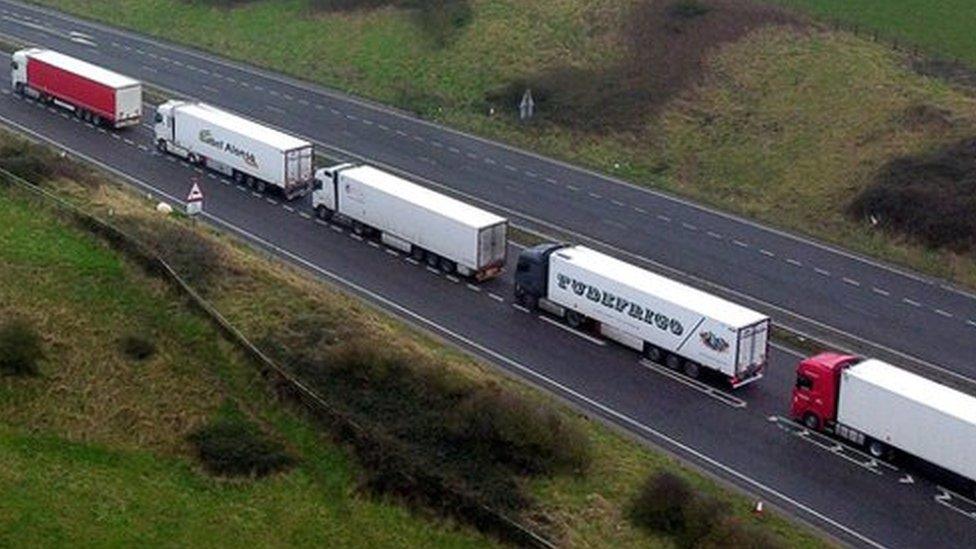
- Published28 January 2022
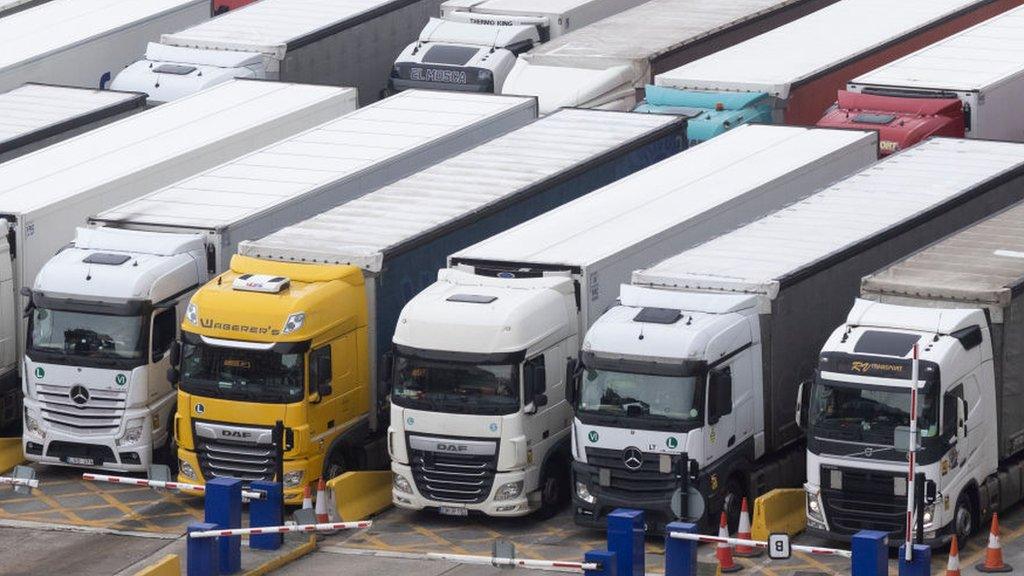
- Published30 December 2020
